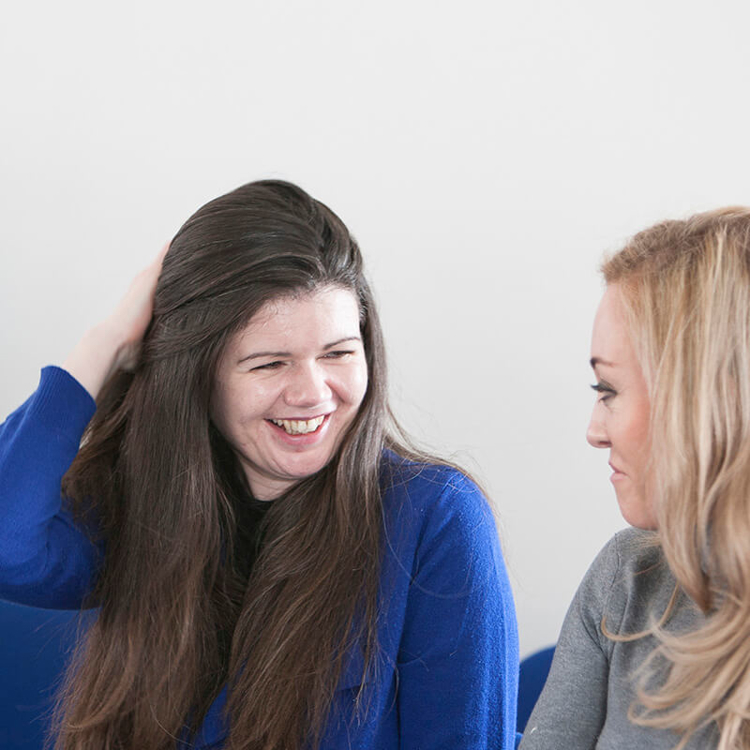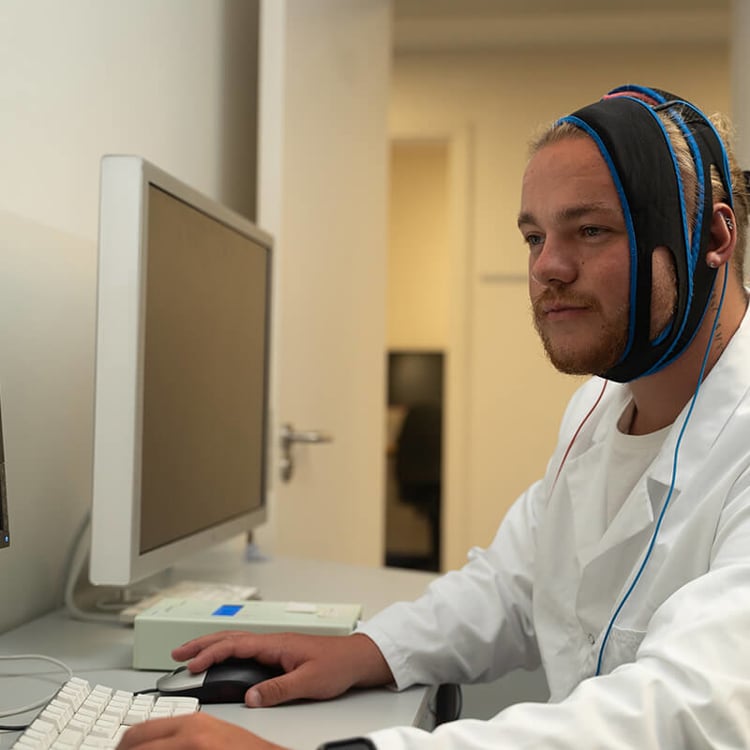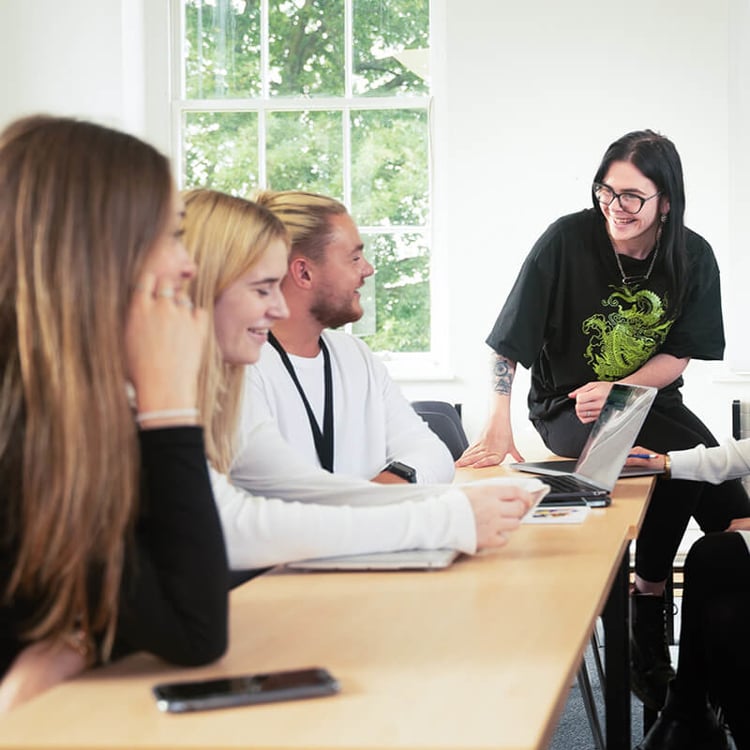/ Undergraduate /
Start date:
September 2025
You'll need:
112–128 UCAS points (or equivalent)
Foundation Year: 64–80 UCAS points (or equivalent)
UCAS Code:
C8L3
C8L2 (if choosing Foundation Year)

On-Campus Taster Day
Wednesday 9 April 2025
Study a degree that prepares you for a career in the dynamic, future-orientated and ever-changing society of psychology and sociology.
Did you know?
We are accredited by the British Psychological Society.

At least 50% of your teaching will be in seminars, lab classes or workshops.
Top modern university in London in Sociology
(Complete University Guide 2025)

Silver in the 2023 Teaching Excellence Framework (TEF)
For delivering high quality teaching, learning and outcomes for our students.

#8 in England for undergraduate student satisfaction
National Student Survey 2024

Foundation Year
This course can also be studied with a foundation year (September entry only).
Modules
These modules are those we currently offer for 1 year (full-time) and may be subject to change.
- Psychology of Resilience and Success
- Introduction to Psychological Research
- The Evolution of Psychology
- Understanding Human Behaviour
- Introduction to Sociology
- Sociology of Everyday Life
September 2025 entry onwards: We are reviewing and updating our curriculum to ensure our programmes provide the skills, knowledge, and experience needed for the evolving job market.
The modules listed are a sample of those currently offered and may change through the review process. However, the core learning outcomes and themes will remain similar.
These modules are those we currently offer for 1 year (full-time) and may be subject to change.
- Cognitive Psychology and Neuroscience
- Understanding the Individual and Society
- Development and Transitions Across the Lifespan
- Psychological Research: Design, Analysis and Impact
- The Sociological Imagination
- Human Rights in Society
September 2025 entry onwards: We are reviewing and updating our curriculum to ensure our programmes provide the skills, knowledge, and experience needed for the evolving job market.
The modules listed are a sample of those currently offered and may change through the review process. However, the core learning outcomes and themes will remain similar.
These modules are those we currently offer for 1 year (full-time) and may be subject to change.
- Psychological Practice for Communities and Industry
- Gender, Sexuality and Human Rights
- Independent Research Project
- Digital Society
- Sociology of Health and Medicine
September 2025 entry onwards: We are reviewing and updating our curriculum to ensure our programmes provide the skills, knowledge, and experience needed for the evolving job market.
The modules listed are a sample of those currently offered and may change through the review process. However, the core learning outcomes and themes will remain similar.
This course offers a foundation year, which takes place at the beginning of your studies. Studying a foundation year will give you academic and practical experience, and a strong introduction to your subject, ensuring you succeed on your undergraduate degree.
30 credits
You will develop your core academic and integrated English language skills of speaking, listening, reading and writing. You will become familiar with key academic skills and concepts, such as referencing methods and awareness of academic integrity and tone. You will apply these skills and knowledge to both broad topics and also your chosen subject pathway.
Teaching and Learning
You will be required to actively engage in on-campus learning for up to 10 hours a week.
You will be taught through a full range of teaching and learning methods, which include lectures, seminars, workshops, discussion groups, group directed tasks and presentations. This will enable you to learn from your peers and tutors in both structured and information settings.
You will be encouraged to think creatively about your approach to learning and discussions with your peers. You will also have access to recordings, resources, links and signposting through Moodle to enrich your learning.
Assessment
You will be assessed through group and individual presentations, comparative and reflective essays, multiple choice exams, coursework and reports, oral exams, portfolios, case studies and blogs.
30 credits
You will develop your research, numeracy and information technology skills. You will investigate the difference between primary and secondary research, conduct your own research project and demonstrate your findings through data analysis. You will also develop your awareness of equality, diversion and inclusion in the UK, through a real-world issue; discrimination in the workplace.
Teaching and Learning
You will be required to actively engage in on-campus learning for up to 10 hours a week.
You will be taught through a full range of teaching and learning methods, which include lectures, seminars, workshops, discussion groups, group directed tasks and presentations. This will enable you to learn from your peers and tutors in both structured and information settings.
You will be encouraged to think creatively about your approach to learning and discussions with your peers. You will also have access to recordings, resources, links and signposting through Moodle to enrich your learning.
Assessment
You will be assessed through group and individual presentations, comparative and reflective essays, multiple choice exams, coursework and reports, oral exams, portfolios, case studies and blogs.
30 credits
This module focuses on an in-depth exploration of applied psychology, drawing on foundational theories and models that explain human behaviour. You will engage with the issues and debates around some of the core psychological concepts, such as prejudice, stereotyping, group dynamics, and conformity, gaining a broad understanding of what influences human behaviours.
The module introduces the bio-psycho-social model within health psychology, providing a holistic framework for understanding health-related behaviours. You will gain a knowledge of how different psychological theories and models can be applied to understand the development of risky health behaviours and can be applied to design effective health intervention strategies.
You will learn the skill of collaborative group work, which is an integral part of the module, encouraging you to apply your knowledge of psychological theories to analyse and present a case study on risky health behaviour. You will also develop the skill of critical analysis, integrating various theories and models in psychology to explain risky health behaviour and suggest intervention programs.
Teaching and learning
The teaching delivery for each module consists of one, one-three-hour lecture and one, two-hour seminar per week. You will learn through a blend of lectures and interactive sessions, case studies and group presentations.
There will be an additional 30 minutes of online support per week. This will consist of individual tasks such as quizzes, posting on discussion forums, watching videos and taking notes, and reading articles or chapters.
Assessment
This module will be assessed using a written assessment and a group presentation.
50% - written assessment, composed of two parts; essay and self-reflection. You will write an essay on your knowledge of at least two psychological theories or models to explain why people develop risky health behaviours and propose and evaluate intervention strategies. You will reflect on your experience and learning journey as you prepared for and wrote the essay.
50% - group presentation, where you will apply knowledge from psychology theories to plan health interventions on risky health behaviour.
30 credits
This module focuses on the different perspectives available in psychology to explain human behaviour.
You will get the opportunity to explore methods of scientific thinking and reasoning within a Psychology context in an enquiry-based way. Problem-based learning and blended learning (combines online and face-to-face time) approaches will facilitate deep, experiential learning.
You will gain knowledge on what scientific thinking is, how to distinguish this from pseudoscience and how the scientific cycle enquiry can be applied to the various perspectives in psychology.
You will be encouraged to explore how different perspective in psychology can explain human behaviour, scientific argumentation and ethical working practices in relation to current scientific topics as reflected in news reports, recent academic publications and historical case studies. You’ll gain the skill of critical thinking and how to apply concepts from psychology to explain everyday behaviour, as well as poster presentation and public speaking.
Teaching and learning
The teaching delivery for each module consists of one, one-three-hour lecture and one, two-hour seminar per week. Lectures will introduce the scientific basis of knowledge and research methodologies in the context of Psychology and empower you to distinguish between science and pseudoscience, while seminars will consist of individual and group activities on the weekly topics.
There will be an additional 30 minutes of online support per week. This will consist of individual tasks such as quizzes, posting on discussion forums, watching videos and taking notes, and reading articles or chapters.
Assessment
This module will be assessed using a group poster presentation and written assessment.
40% - group poster presentation, you will compare and contrast any two perspectives on psychology.
60% - written assessment, you will write a critical essay on how pseudoscience differs from science.
These modules are those we currently offer and may be subject to change.

Skills
You’ll focus on developing ‘psychological and sociology literacy’ and the ability to apply knowledge for the benefit of self, community, and society.
This includes opportunities for reflective learning, self-development and practical applications.
You’ll gain a unique and rich understanding through a psychological and sociological lens of:
- Human behaviour
- Health and wellbeing
- Social processes and inequalities
- Experiences of the individual and society
You’ll develop a range of skills, that are valued by employers. These include:
- Reasoning
- Problem solving and analytical skills
- Effective communication
- Reflective and critical thinking
- Creativity
- Data analysis
- Interpersonal sensitivity and awareness
You’ll learn core and contemporary subjects within psychology and sociology and shape your degree around your own interests and ambitions. Topics include:
- Sociology of everyday life
- Human rights in society
- Digital society
Professional accreditation
Our degree is professionally accredited by the British Psychological Society (BPS). This means if you graduate with at least a 2:2 you’ll be eligible for Graduate Basis for Chartered Membership (GBC) of the BPS. Your first step on the path to becoming a Chartered Psychologist.
It also means our teaching is of the highest standard, and you’ll receive excellent levels of support within our School.
Learning
Get ready for your future with tailored teaching and contact time.
On our BSc Psychology and Sociology, you’ll be taught innovatively through lectures and small group seminars. At least 50% of your teaching will be in seminars, lab classes or workshops.
You’ll be learning through our enthusiastic and supporting academic tutors, who are also practitioners and involved in the latest research.
You’ll apply your knowledge of concepts and theories of current issues and problems through:
- Assessments
- Essays
- Exams
- Portfolios
- Presentations
- Authentic assessments
As our courses are taught over no more than three days per week, you’ll have the flexibility to take on paid part-time work, placements, or internships – gaining real-world experience before you graduate.

Assessment
There are multiple opportunities for you to integrate theory and practice to real-world applications.
You’ll demonstrate your skills and understanding through:
- Exams
- Lab reports
- Essays
- Portfolios
- Case studies
- Presentations
- Research summaries
Between Years 2 and 3, you can also opt for a professional placement year, meaning you have the opportunity to apply for a placement and gain valuable real-world experience.
Careers
Earn a degree you can excel with.
Your future could be in:
- Scientific research and teaching
- Youth and community work
- Charitable organisations
- Local and national government, public sector and police
- Law and legal services
- Financial services
You could continue your studies and become a forensic, counsellor, or occupational, educational or clinical psychologist.

Open days
Get a real taste of our campus, community and what it’s like to study at Roehampton
Applying
Full-time UK undergraduate students apply through UCAS.
Course subject to curriculum review and validation.
Entry tariff
112–128 UCAS points (or equivalent)
Foundation Year: 64–80 UCAS points (or equivalent)
Looking to work out your UCAS points or find out about our entry requirements? Find out more.
When we consider applications to study with us, we form a complete view of your achievements to date, and future potential, and can offer flexibility in entry requirements. Find out more about our Contextual Offer scheme.
Specific entry requirements
GCSE (or equivalent) requirement: Maths, Grade C/4.
General entry requirements
September 2025 entry tuition fees
UK (home) tuition fees
Undergraduate degree: £9,535
Foundation Year: £9,535
We offer a wide range of scholarships and bursaries. See our financial support pages for UK students.
We also provide other ways to support the cost of living, including free buses and on-campus car parking, hardship support and some of the most affordable student accommodation and catering in London. Find out more about how we can support you.
International undergraduate students apply through our direct application system.
Course subject to curriculum review and validation.
Entry tariff
112–128 UCAS points (or equivalent)
Foundation Year: 64–80 UCAS points (or equivalent)
Looking to work out your UCAS points or find out about our entry requirements? Find out more.
When we consider applications to study with us, we form a complete view of your achievements to date, and future potential, and can offer flexibility in entry requirements. Find out more about our Contextual Offer scheme.
Specific entry requirements
GCSE (or equivalent) requirement: Maths, Grade C/4.
General entry requirements
September 2025 entry tuition fees
EU and international tuition fees
Undergraduate degree: £16,950
Foundation Year: £16,950
International Foundation Pathway: £16,950
We offer a wide range of scholarships and bursaries. See our financial support pages for international students.
We also provide other ways to support the cost of living, including free buses and on-campus car parking, hardship support and some of the most affordable student accommodation and catering in London. Find out more about how we can support you.






